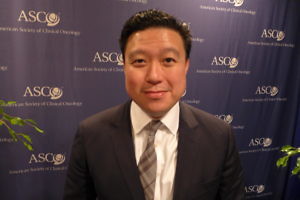Contemplations on ASCO Lung Cancer Data with Dr Stephen Liu
Lung cancer, along with metastatic melanoma, has been very much to the forefront of attention in cancer immunotherapies with both nivolumab (Opdivo) and pembrolizumab (Keytruda) garnering approval as monotherapy from the FDA in second line treatment of NSCLC. A third molecule, atezolizumab (Tecentriq) has also been submitted to the authorities for this indication and a decision is expected soon.

Street art in the Chicago West Loop
While no one is in any doubt that the response rates with monotherapy are low (in the 20% range) and the majority of people do not respond, the important thing so far is that when they do, they appear to be very durable responses. People are living longer, much longer than the 2–3 months of incremental improvement we are used to seeing with chemotherapy or targeted therapies.
The race is now on to see how we can improve things for the 80% of people with lung cancer who don’t respond to single agent therapy:
- What can we do to help them?
- Which combinations look more encouraging?
- Should we treat beyond progression?
To answer these questions, we interviewed Dr Stephen Liu and discussed his views on some of the cancer immunotherapy combination studies presented at ASCO last week.

Dr Stephen Liu at ASCO 2016
Dr Liu is a lung cancer expert at the Lombardi Cancer Centre at Georgetown University, and is actively involved in numerous clinical trials, particularly in Developmental Therapeutics.
Georgetown’s founding principle is Cura Personalis, which translates as care of the whole person. It “suggests individualized attention to the needs of others, distinct respect for unique circumstances and concerns, and an appropriate appreciation for singular gifts and insights.”
Dr Liu embodies this ideal, advocating for his patients for access to the best research advances, including genomics and clinical trials of promising agents. At ASCO, he kindly highlighted some of the important findings from Chicago and offered context on why they matter to the field.
He told us one combination was “potentially transformative” and could be “practice changing” in lung cancer with more data.
Intrigued? To find out what these important trials are and which ones to watch out for, subscribers can log-in to read the article.
This content is restricted to subscribers